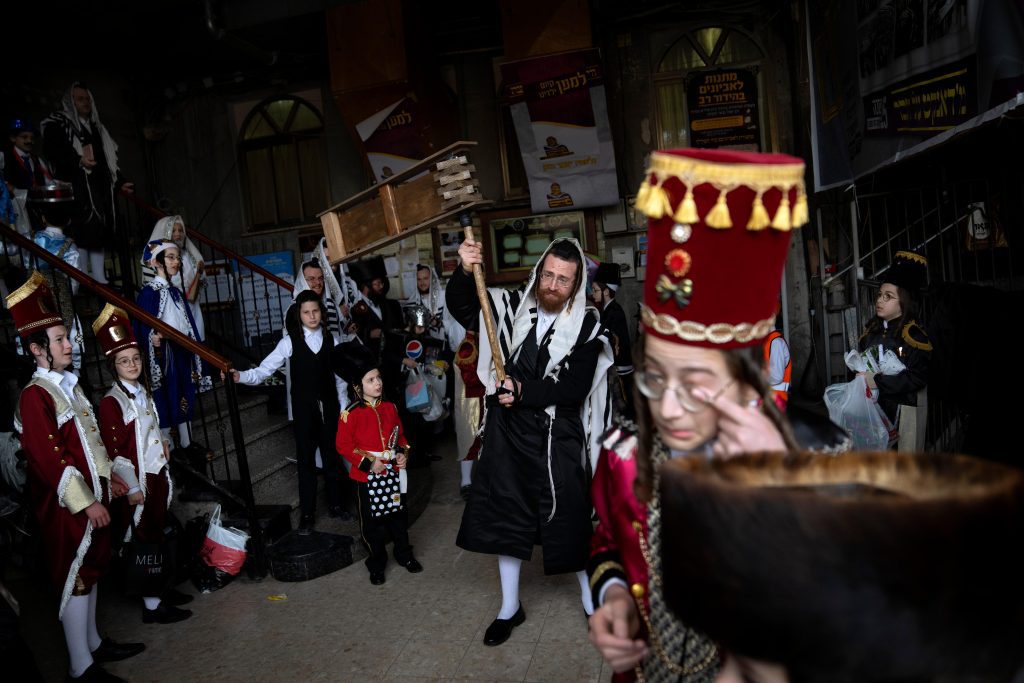By DAVID CRARY (Associated Press)
Purim is often seen as the most joyous of Jewish holidays — celebrated with costumes, skits, noisemakers, and different levels of rowdiness.
It commemorates the biblical story of how an attempt to annihilate Jews in Persia was stopped, and so it is seen as a confirmation of Jewish survival throughout history. This year, it holds extra significance during a war in Gaza triggered by the Oct. 7 attacks on Israel by Hamas, resulting in 1,200 deaths and around 250 hostages. The United States, Canada, and the European Union have labeled Hamas as a terrorist group.
WHEN IS PURIM?
Purim is celebrated on the 14th day of the Hebrew month of Adar. This year, it begins on Saturday night and continues through Sunday. In most of Jerusalem, the holiday is celebrated a day later, from Sunday evening until Monday.
WHAT’S THE STORY THAT INSPIRED PURIM?
Here’s an account from the Union for Reform Judaism:
“The main communal celebration includes a public reading — typically in the synagogue — of the Book of Esther, which recounts the holiday’s story: During the reign of King Ahashverosh, Haman, the king’s adviser, plans to wipe out all the Jews of Persia. His scheme is foiled by Queen Esther and her cousin Mordechai, who ultimately save the Jews of Persia from annihilation. The reading usually involves a lively atmosphere, with booing and noise-making when Haman’s name is mentioned. …
Throughout the years, Haman has come to represent every anti-Semite in every place where Jews were persecuted. The significance of Purim lies not so much in its origin, but in what it has evolved into: a grateful and joyous affirmation of Jewish survival.”
WHAT’S UP WITH COSTUMES THIS YEAR?
Due to the conflict with Hamas, Israel’s Education Ministry has cautioned students against wearing costumes “that may cause fear, panic, or harm.”
This includes costumes portraying Yahya Sinwar, the leader of Hamas in Gaza.
Before the holiday, Israeli police have also confiscated thousands of realistic toy guns and grenades as part of “Operation Dangerous Toys.”
The ministry stated that the instruction was issued “in the shadow of the war and based on the security situation and the current circumstances.”
Many cities in Israel have called off traditional Purim parades in light of the war in Gaza.
SOMETIMES A DARK SIDE TO THE HOLIDAY
Similar to holidays of other religions, Purim has at times been used as an occasion for highly visible acts of violence.
On Purim in 1994, Baruch Goldstein, an American Israeli settler, killed 29 Palestinian Muslims praying at the Cave of the Patriarchs in the West Bank city of Hebron.
Two years later, in the nine days leading up to Purim, around 60 people died in a series of bombings attributed to Palestinian militants. The deadliest of these attacks, on the eve of Purim, saw a suicide bomber detonate a bomb outside a Tel Aviv shopping mall. Thirteen Israelis were killed, including five children in Purim costumes.
WHAT RABBIS HAVE BEEN SAYING BEFORE PURIM?
There have been different attitudes expressed by rabbis this year in comments about Purim.
For instance, Yitzhak Yosef, Israel’s chief Sephardic rabbi, mentioned a desire to defeat Hamas as he recently issued a ruling on how Israeli soldiers stationed in Gaza should celebrate Purim.
The ruling said, “May it be God’s will that he will uproot them (Hamas) and destroy them and make them perish soon in our days.”
Two New York City rabbis took a different approach, referring to the loss of over 30,000 Palestinian lives in the Israel-Hamas war, in a March 7 opinion piece in The Forward, an online news publication serving an American Jewish audience.
Rabbis Amichai Lau-Lavie and Rachel Timoner wrote, “This year, let us put down the noise makers, lower our voices, or find other ways to conclude this story with sobriety. Let it serve as a moment of reflection on our impulse for revenge, on the grave responsibility that comes with holding power, and on the moral consequences of failing to honor human life in the name of self-defense.”
The rabbis suggested that one way to observe Purim this year would be through charitable donations to organizations working to meet the humanitarian needs of both Israelis and Gazans.
Associated Press religion coverage receives support through the AP’s collaboration with The Conversation US, with funding from Lilly Endowment Inc. The AP is solely responsible for this content.









